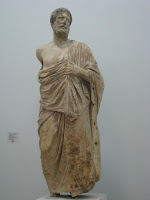 The Hippocratic Oath is probably Hippocrates' greatest contribution to Medicine. This text was written some 2.500 years ago by Hippocrates or by some of his followers and has been sworn to for centuries by members of the medical profession. Throughout the ages it has often been altered or adapted but has always remained the basis of all texts pertaining to ethical medicine. One of the most famous texts that was inspired by the Oath is the Declaration of Geneva (first drafted in 1948, and repeatedly amended thereafter) by the World Medical Association. Although today many different versions of the Oath are sworn to by medical students, some universities still use the original.
The Hippocratic Oath is probably Hippocrates' greatest contribution to Medicine. This text was written some 2.500 years ago by Hippocrates or by some of his followers and has been sworn to for centuries by members of the medical profession. Throughout the ages it has often been altered or adapted but has always remained the basis of all texts pertaining to ethical medicine. One of the most famous texts that was inspired by the Oath is the Declaration of Geneva (first drafted in 1948, and repeatedly amended thereafter) by the World Medical Association. Although today many different versions of the Oath are sworn to by medical students, some universities still use the original.
The Hippocratic Oath establishes that physicians must maintain life, hold their elders in the highest regard, know their limitations, and renounce self interest during the treatment of patients. The views about abortion and surgical practices might seem somewhat outdated in today's world and in many people's minds the relevance of the text is often challenged. Although there are limitations and much is debatable, the Oath's precepts remain eternally modern and it's core value will always be pertinent: the selfless dedication to the preservation of human life. The moral message of the Oath has thus remained resilient throughout the ages and the cultures.
I have added hereafter the original text written in Ionic Greek around the 5th century B.C. as well as a translation of the text in English:
|
Translation in English:
- I swear by Apollo, the healer, Asclepius, Hygieia, and Panacea, and I take to witness all the gods, all the goddesses, to keep according to my ability and my judgment, the following Oath and agreement:
- To consider dear to me, as my parents, him who taught me this art; to live in common with him and, if necessary, to share my goods with him; To look upon his children as my own brothers, to teach them this art; and that by my teaching, I will impart a knowledge of this art to my own sons, and to my teacher's sons, and to disciples bound by an indenture and oath according to the medical laws, and no others.
- I will prescribe regimens for the good of my patients according to my ability and my judgment and never do harm to anyone.
- I will give no deadly medicine to any one if asked, nor suggest any such counsel; and similarly I will not give a woman a pessary to cause an abortion.
- But I will preserve the purity of my life and my arts.
- I will not cut for stone, even for patients in whom the disease is manifest; I will leave this operation to be performed by practitioners, specialists in this art.
- In every house where I come I will enter only for the good of my patients, keeping myself far from all intentional ill-doing and all seduction and especially from the pleasures of love with women or men, be they free or slaves.
- All that may come to my knowledge in the exercise of my profession or in daily commerce with men, which ought not to be spread abroad, I will keep secret and will never reveal.
- If I keep this oath faithfully, may I enjoy my life and practice my art, respected by all humanity and in all times; but if I swerve from it or violate it, may the reverse be my life.